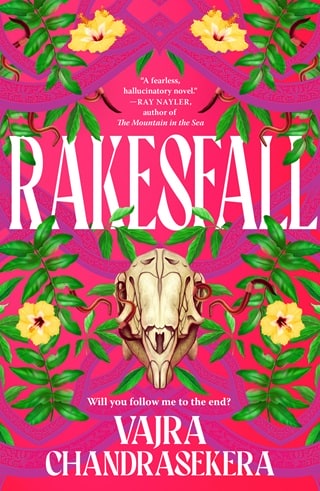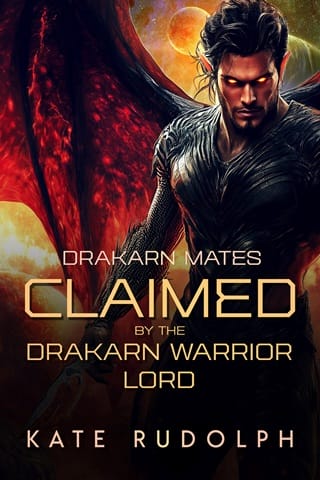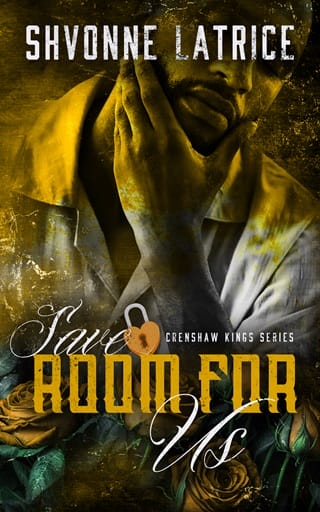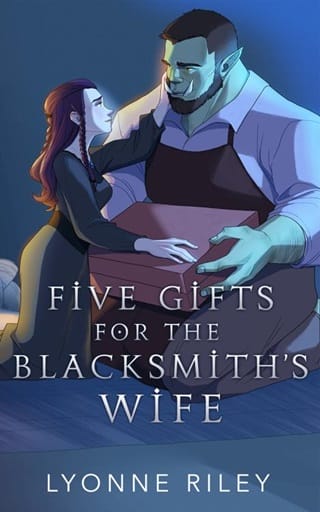Chapter 8 Vidyucchika
The bathroom door won't stay locked; death has not freed me from the curse. No closed doors for me, even at my own funeral.
I'm tired of funerals. I resent mine as another entrant in the endless epicyclic death rites past and future, interlocking like gears with their tiny little teeth: the annual remembrances of my parents, the fading memories of my grandparents and their grandparents, of uncles and aunts and kin without end, of cousin whatsisface who got run over by the lorry, other cousin who deserted from the army and drank himself to death, and now me. I am dead, or at least, I am not I; I am wearing the body of my audacious, rebellious, newly dead brother-self, always going early, always taking the path I can't follow, the hare that runs ahead but loses the race. I don't like to say the names our parents gave us at birth. I like nicknames, but we left Leveret and Annelid behind worlds ago: the hare is dead, and I am the conquering worm.
New nicknames seem called for. I have called him Lambakanna before, the long-eared, like the princes of old. I'll call him Lambajihva in honour of his act of war, and in recognition of the last thing he saw, his own face, my face, this face whose shredded remains I am avoiding in the mirror. It means the long and dangling tongue, and it is the name of a demon king.
I'll call myself Vidyucchika, who can change her shape at will. It means electric head—I'm here, I'm queer, I'm rock and roll. It is an aspirational nickname only; I'm not any of those things. I am not yet malleable and fluid. I am only ripped up, broken from all the dying.
I've stopped bleeding, at least, in death, but there's a reason I'm hiding in the bathroom at my funeral. I owe him better than a new name; I'm supposed to go out there for last rites, to lead a procession, to climb up on my pyre. I think of the peace of bones in the earth, but we are people of the pyre, as my parents would have said before they went into theirs. We are meant to be ashes in running water, heading out to sea.
My bloody and bound chest itches. Behind the stitches it aches.
On the other side of the bathroom door, the monks are chanting in a dead language again. I press my ear to the wood and shiver in their vibrato: seven monks of various ages, dressed in red and bloody saffron, singing in harmony, the slowly ticking bomb of southern Theravada Buddhism. My assembled surviving family are their audience, dressed in white and sitting on the floor, mumbling along. More aunts and uncles, nephews, nieces, grand-this, great-grand-that, the cousins who've dodged lorries, bullets, and the military police. By definition, there is no end to kin: everyone on this island and off it is a cousin of some degree of separation.
It's hot, the cloying humidity of just-before-the-storm, the monsoon already delayed by months if it even comes, if it isn't going to be another drought year of farmer suicides and water cuts in the city, ever more frenetic advisories from the Disaster Management Centre for Safer Communities and Sustainable Development in Sri Lanka, warnings of a rising heat index warranting Extreme Caution, auguries of strong winds and rough seas. This is the long pause of ratcheting tension before the storm breaks. Some years the storm never breaks, and the heat just rises forever.
I think of my mother—no, not that mother, nor the other one, but the other other one, though does it matter? Every mother is next to last in a long line of witches—and I think of her visions, her astrology, her quantified self. She was happy to plan for her future as ashes in the river, matter and energy conserved, the tiny grains and uncompromised bone shards of her like a school of fish, seeking out the ocean. It was a better thought than a next life in Madurai, putting on new showings of the same old play with my father. No, now it's me confusing my mothers. All ashes mix together in the water.
Soon someone will come looking for me and when they try the bathroom door which I have locked it will just open and they'll say oops sorry but I'll still have spilled out, or the world spilled in. The lip of my cup is cut, it bleeds water before it's full.
And then that someone will realize it's me, and they'll say what are you doing hiding in here and they've been looking for you, it's time and I'll say time for what as if I didn't know and they'll say it's time for the thing with the pot. Maybe they'll try to demonstrate the action, arms out like they're sitting on the floor among assembled kin, out in front of the monks, holding a small porcelain pot and pouring cold water out into a little cup until the cup overspills and waterfalls into the saucer, while the pourers chant idam me natinam hotu, this to my kin.
We the bereaved are supposed to recite that, this to my kin, this to my kin, in counterpoint to the monks' own chant that tiresomely reiterates the symbolism of rivers and oceans, conjuring the imaginal stage of our dead as newly made hungry ghosts waiting to be fed with our overflowing love so that their smiling teeth don't grow sharp, so that their familiar eyes don't grow cruel. If you pour out enough of yourself, your love, yes, but more than that the moral weight of your fulfilled duty in carrying out the death rites, your dead can move on to a higher life.
In Theravada, everything is a gamified hierarchy with duty its basic mechanic, a clockwork of ratcheting, cycling gears and flywheels, rites repeating like history in cycles and epicycles. Sitting on the floor in front of a monk is a duty: they rank higher than you, so to sit at the same level is cosmic disorder. They get a chair with a white cloth over it, and you get a reed mat and the obligation to address them with gestures, honorifics, and grammatical registers once used by peasants to the chiefs and barons of a bygone age. If you do all of the steps correctly, say all the right words, hold all the right intentions, and give all the right gifts, then these achievements will unlock corresponding blessings from the monks, and your dead may go on to better destinies than to be hungry ghosts forever.
And what about the ghosts that were already cruel? Unfed, do they become true demons? Perhaps fending off that fate alone is reason enough for us to have continued the annual death rites for my father all this time.
Year after year, it's been Lambajihva who carried the weight of those days, who bore those fendings and feelings. Whenever it came time to pour the water out, it was his hand bearing the pot, while I withheld the weight of my intentions, refusing complicity in mourning. I can't imagine doing it today, for him, for myself. I don't feel the strength in me to lift a porcelain pot of water. My skin is fevered, itching. My chest is tongues of red licking lazily up from my navel, up the line of stitches, the thread shrivelling. But no, there is no fire; I undo my bloodied shirt quickly and my stitches with care, the long series of tiny X's, the thread still black and thick. My chest comes apart without ceremony, like a mundane unboxing. The seam is a vertical line from my navel upward, triumphantly upraised in a V beneath my clavicles, spreading out to my shoulders. I tug at the unstitched edges, bending them back. The skin makes a long, soft sucking sound as it comes away from the flesh.
The pelt peels back for me. I am the thing inside, raw bones in red meat. She's never been out before—Lambajihva was always first out, and had his deaths to reckon with—though she tried, in this childhood, only to be exorcised, contained, reskinned, stitched back in. I learned the words and steps of the exorcism, and I learned to do it for myself after that. It saved the hassle, the expense, the staying up all night chanting, the exhaustion of the yakadura, the lives of many a black rooster. It was easier, more economical. He was my own skin, she was my own flesh and blood. I could put my hand over my heart and say to her, please. I could hit myself in the heart and say no, shut up. Not now, not ever never.
The skin comes off and falls to the floor. What sheds the hairy pelt and cartilage is what she grew into, a skinless young crone in training, a bloody witch of the old ways, a journeywoman taking her first step. Her unstitched surface feels the sting of cut lemon.
It takes a long, long moment after the shedding for her to open into I; on that threshold, the I is shared awkwardly between the red witch at the mirror and the pelt that falls to her feet, the discard, the disce aut else, that which was learned but not by choice. To the fallen pelt, she is a monstrous hatching, she who killed me and ate me from the inside out to walk free.
Then that distance fades, and I see that I am seeing with wide eyes open in my red raw face, the whites interrupted by bloody branchings. The hair and the beard went with the pelt, but I kept my long eyelashes. I've always loved those. I can't remember if I look like I used to. My face, unmanaged by skin, shivers and shifts. I kick the pelt at my feet, but then I am wretched and pick it up and fold it into a bundle. I can't lose it; it must never fall into someone else's hands, in case ancient laws give them power over me, over my flesh and form, the authenticity of my translation.
But more and less than that, I've worn my pelt so long I don't think I could stand to lose it, for all that I have spent a lifetime waiting to finally unstitch, to leave this pelt puddled at my feet. I'm my own banana peel; I'll never be short a skin to slip on. It's a joke. Sometimes you have to laugh. I press the bundled pelt to my heart with my left hand. My laughter echoes in the empty bathroom. I feel for my crotch with my free hand and am comforted by its smoothness, its emptiness. The pelt is more than mere dermis; what I've shed is his full-grown self, his decades of learning to make do, to move through, to get used to. I will have to relearn many things. I clutch him tighter to me but leave my clothes where they fell. I'm too raw for cloth, and nudity is a taboo for the skinful. I am beyond nakedness. It is not possible to be more exposed than this.
I leave red marks on the white porcelain. I can't help touching it. It's everywhere and it's so cooling and clean. It begs pollution. I leave red handprints, sulkily, spitefully, on the sink, making art in the oldest of traditions, until I think I hear steps outside, on the other side of the door. The curse coming to break my bubble. In desperation, I rush to the other side of the bathroom. Closing the lid of the toilet and climbing on it, I can just about reach the tiny bathroom window. I feel instinctively that it should be too small for me, but I've shed so much mass and I'm so well lubricated in red that perhaps it isn't. I open it as wide as it will go and shove my wadded pelt through. It lands with a thump on the outside. There, now I have no choice but to follow it.
I slip my head through, turning it sideways to fit, then my left arm and shoulder. It's a tight fit; for once I am glad for my flat chest. Shedding the pelt has made me gracile and slick. I breathe in, push and scrabble, and my chest is through, then my other shoulder, my belly. And then my centre of gravity flips and I'm falling through, falling to the ground outside, jarring myself, tumbling heels over head. I'm easily bruised like this. I've left a layer of fluid across the wall and windowsill, like a snail's trail in red. But as I stagger and tilt to my feet outside, I hear the bathroom door open, and through the window I hear someone say oops sorry and close it again. Perhaps they mistook my stains for me.
I'm at the back of the house, unseen. The curse will soon break that small privacy, of course. Someone will turn a corner and eyes will fall upon me. But right now, I imagine a species of giddy freedom that doesn't care about a curse of decontainment. I could walk away. The last true fetter on me was my skin, my other's skin; the memory of our shared childhood, the debt I owed him for his protection, for making him lead the way into death. Now am I skinless and reckless and free.
I could run to the back fence, the gravel digging into my bloody soles, and vault it. I could disappear into the low forest beyond, pushing aside its thorns and undergrowth. Oh, it's not real forest; it's just an old coconut estate—grown wild through negligence and haunted, like me. I could trust my curse to the polecats and the monkeys, the bats and mosquitoes. Is it wilderness I want, though? I could move farther and farther inland, follow my grandmother's map, go east into history and seek out the deep past, from abandoned estate to brownfield through the interconnected waste spaces of the urban and eventually rural drosscape in search of the lost rainforest. I am the last priest of a strange old religion. I could go dance the dances that I know.
I pick up the pelt to make a bundle of it in my arms. The beard is scratchy on my forearm: I turn it around, then I unfold and refold to tuck the face away into the belly. I don't want to look at it.
Instead, I think of a grimy beach scoured free of sand and barricaded with black rocks against erosion. On the other side of the city, the coastline. I could walk there by sunset. I could find my way to those rocks, clamber redly across them like a stranded southern elephant seal too far from home. I could get into the sea, submerge my abraded surfaces in salt and scream into the ocean, joined by the ashes of my fathers and mothers and countless kin, millions of strangers, the piss of billions of fish, and trillions of pieces of microplastic. I could swim south; first into hotter equatorial waters but only as a way of getting beyond them into colder ones, then colder still. I've run hot and fevered all my life. I could swim and swim until at last I found a wet open place where I could lie exposed on a frozen surface underneath a cold sun, my skinless feet dangling in water so chill it slows my heart. I could look for that cold place. I could redden a glacier, make a bruise they'd see from space. Maybe somewhere in the sea, far out in international waters, I'd find the right current to let my pelt fall away for good.
Instead, I take my pelt and shake it out. I swing it behind me like a cape, knot its hairy paws around my neck, pull the head and shoulders over my bare red crown like a shawl. Then I walk around the corner of the house and find my way to the front of the crowd. I can be my own curse for a while. I don't need it to come and get me.
I pick my way between my seated kin, my bloody feet staining the plastic mats imitating reed, the bits of skirt or sarong that aren't tucked away quickly enough. The susurration of the crowd grows as I move through it. The head monk falls silent mid-sermon. At the front of the crowd is the empty mat on which stands a full porcelain pot of water and an empty cup on a saucer. I kneel beside them. I pick up the pot with both hands: one on the handle, one on the spout. My handprints are crisp red flowers on the white-and-blue porcelain. This to my kin, I say in a dead language, looking the head monk in the eye. I imagine what it would be like to upturn his black begging bowl over his head and put the porcelain to the shatter. I can almost feel the vibration in my arm.
As the river, the monk says, his eyes on mine, and stops to cough. Then he starts again. As the river—go on, you can pour now—as the river fills the ocean—
This to my kin, I say, and I pour the water out with a finger at the spout, such that a thin furling trail of red is present in the water when it fills the cup and spills over.
 Fullepub
Fullepub 



